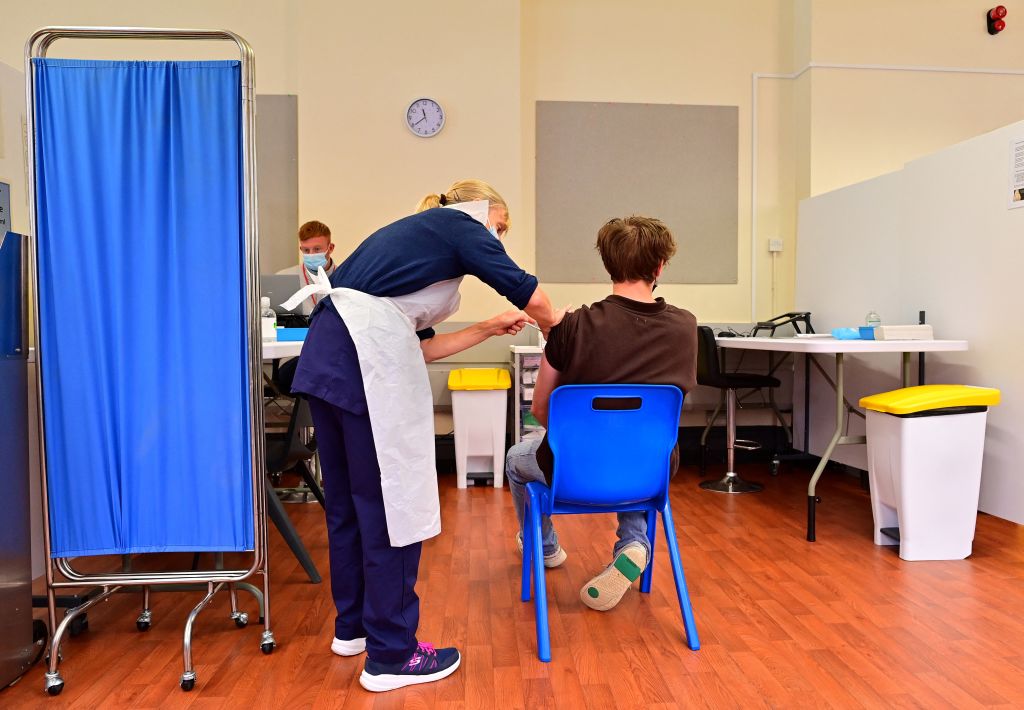The White House's booster push was reportedly prompted in part by supply fears


A free daily email with the biggest news stories of the day – and the best features from TheWeek.com
You are now subscribed
Your newsletter sign-up was successful
The White House push for a September COVID-19 booster shot rollout was at least in part motivated by supply concerns, Politico reports.
Top advisers reportedly encouraged Biden to announce the booster plan in case the U.S. ran "short of doses needed to offer the shots to its entire population if vaccines' protection decreased suddenly," Politico writes, according to the account of two senior officials. The administration wanted to ensure there were enough doses for the 40 percent still in need of their first shot, as well as those who would eventually need some reinforcement.
The deliberations "underscore the extent to which top Biden administration officials were guided by concerns about future American vaccine supply, not just international data on vaccine performance, in developing their vision of a sweeping booster rollout," Politico writes. "No one wants to be the person responsible for not having the doses when we need them," said one individual.
The Week
Escape your echo chamber. Get the facts behind the news, plus analysis from multiple perspectives.

Sign up for The Week's Free Newsletters
From our morning news briefing to a weekly Good News Newsletter, get the best of The Week delivered directly to your inbox.
From our morning news briefing to a weekly Good News Newsletter, get the best of The Week delivered directly to your inbox.
The concern, however, is that by stockpiling even more doses for domestic use, the U.S. will encourage other wealthy countries to follow suit, "tightening an already strained international manufacturing system," and perhaps impacting U.S. donations to low-income countries, Politico writes. Some officials and experts have argued the focus should instead be on ramping up global vaccination rates to prevent the emergence of new variants.
Said Celine Gounder, an infectious disease specialist: "You basically would have high income and some low-and middle-income countries that would be getting third doses, and then you would have lower-income countries with nothing."
On Friday, a Food and Drug Administration advisory panel voted against recommending the use booster shots of the Pfizer-BioNTech vaccine for people 16 and older, instead endorsing a narrower plan to administer extra doses to those 65 and older and those deemed high-risk. Read more at Politico.
A free daily email with the biggest news stories of the day – and the best features from TheWeek.com
Brigid Kennedy worked at The Week from 2021 to 2023 as a staff writer, junior editor and then story editor, with an interest in U.S. politics, the economy and the music industry.
-
 How the FCC’s ‘equal time’ rule works
How the FCC’s ‘equal time’ rule worksIn the Spotlight The law is at the heart of the Colbert-CBS conflict
-
 What is the endgame in the DHS shutdown?
What is the endgame in the DHS shutdown?Today’s Big Question Democrats want to rein in ICE’s immigration crackdown
-
 ‘Poor time management isn’t just an inconvenience’
‘Poor time management isn’t just an inconvenience’Instant Opinion Opinion, comment and editorials of the day
-
 A Nipah virus outbreak in India has brought back Covid-era surveillance
A Nipah virus outbreak in India has brought back Covid-era surveillanceUnder the radar The disease can spread through animals and humans
-
 Trump HHS slashes advised child vaccinations
Trump HHS slashes advised child vaccinationsSpeed Read In a widely condemned move, the CDC will now recommend that children get vaccinated against 11 communicable diseases, not 17
-
 Covid-19 mRNA vaccines could help fight cancer
Covid-19 mRNA vaccines could help fight cancerUnder the radar They boost the immune system
-
 FDA OKs generic abortion pill, riling the right
FDA OKs generic abortion pill, riling the rightSpeed Read The drug in question is a generic version of mifepristone, used to carry out two-thirds of US abortions
-
 The new Stratus Covid strain – and why it’s on the rise
The new Stratus Covid strain – and why it’s on the riseThe Explainer ‘No evidence’ new variant is more dangerous or that vaccines won’t work against it, say UK health experts
-
 RFK Jr. vaccine panel advises restricting MMRV shot
RFK Jr. vaccine panel advises restricting MMRV shotSpeed Read The committee voted to restrict access to a childhood vaccine against chickenpox
-
 Texas declares end to measles outbreak
Texas declares end to measles outbreakSpeed Read The vaccine-preventable disease is still spreading in neighboring states, Mexico and Canada
-
 RFK Jr. shuts down mRNA vaccine funding at agency
RFK Jr. shuts down mRNA vaccine funding at agencySpeed Read The decision canceled or modified 22 projects, primarily for work on vaccines and therapeutics for respiratory viruses
